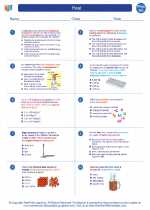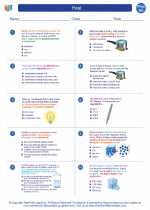Antibiotics: Explanation and Study Guide
Explanation
Antibiotics are medicines used to treat bacterial infections. They work by targeting and killing the bacteria that are causing the infection. It's important to note that antibiotics are not effective against viral infections such as the common cold or flu.
There are different classes of antibiotics, each with its own mechanism of action and spectrum of activity. Some common classes of antibiotics include penicillins, cephalosporins, tetracyclines, macrolides, and fluoroquinolones.
When taking antibiotics, it's crucial to follow the prescribed dosage and complete the full course of treatment, even if you start feeling better before the medication is finished. This helps to prevent the development of antibiotic resistance.
Study Guide
- Introduction to Antibiotics: Understand the definition of antibiotics and their role in treating bacterial infections.
- Classes of Antibiotics: Familiarize yourself with the different classes of antibiotics, their mechanisms of action, and common examples within each class.
- Antibiotic Resistance: Learn about the concept of antibiotic resistance and the importance of using antibiotics responsibly to combat this global health challenge.
- Indications and Contraindications: Understand the conditions for which antibiotics are prescribed and situations in which they should not be used.
- Adverse Effects and Side Effects: Explore the potential adverse effects and side effects associated with antibiotic use, and how to manage them.
- Importance of Completing the Full Course: Understand the rationale behind completing the full course of antibiotics and the implications of incomplete treatment.
- Future of Antibiotics: Explore the research and development efforts aimed at addressing antibiotic resistance and the discovery of new antibiotics.
By mastering these topics, you will gain a comprehensive understanding of antibiotics and their significance in healthcare.
.


